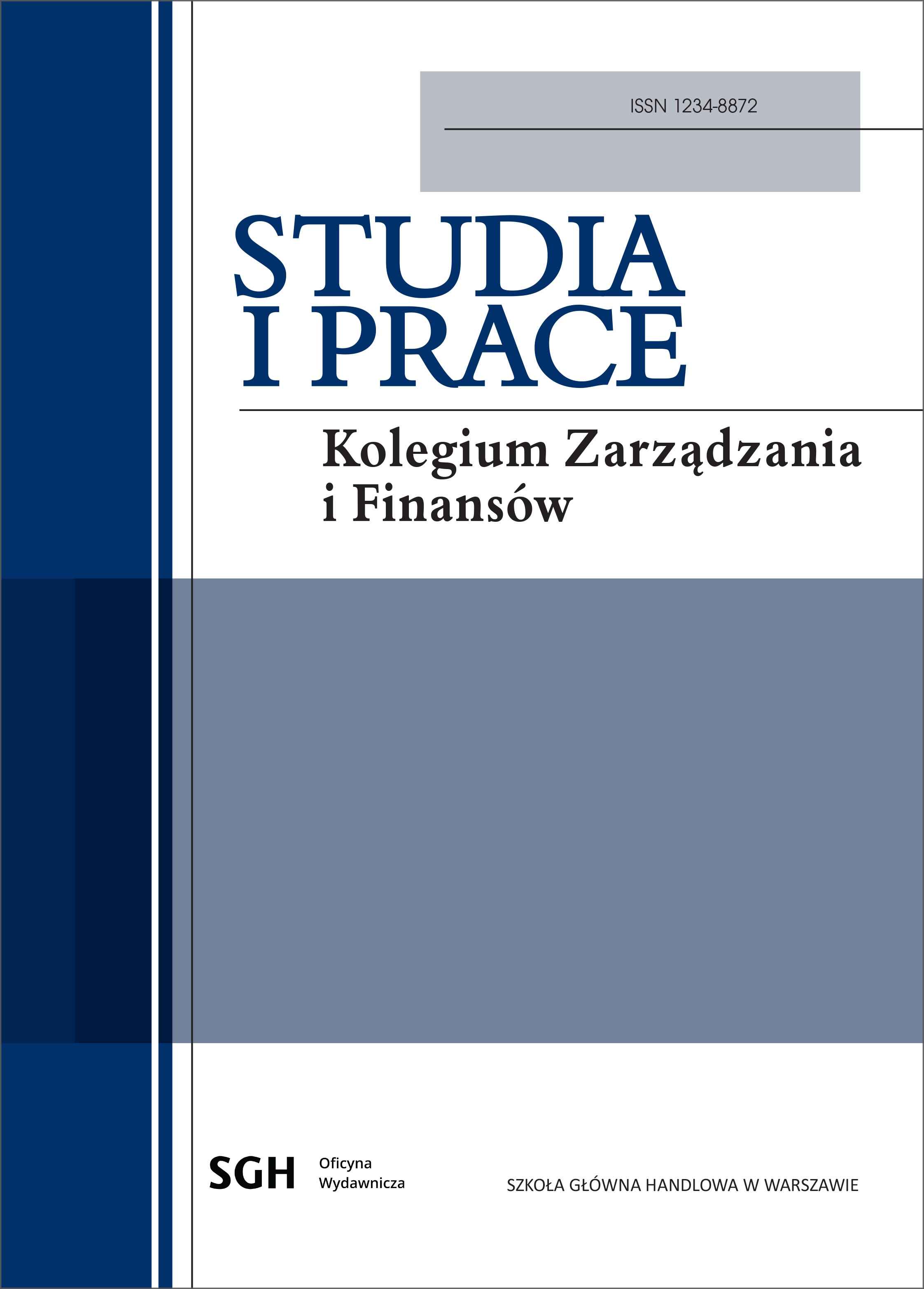Key success factors in business management during the COVID-19 pandemic
DOI:
https://doi.org/10.33119/SIP.2022.184.5Keywords:
pandemic, COVID-19, enterprise, successAbstract
The purpose of the text is to identify and categorise the key success factors of selected companies during the global COVID-19 pandemic. In the theoretical part, the conditions for the functioning of enterprises during the COVID-19 pandemic were identified, and then success factors were diagnosed as a category that explained the results of enterprises during this period. The aim of the work was achieved through empirical research carried out on a sample of 22 companies representing various sectors, both global and local. The research was conducted using the triangulation of research methods. The main method used in the research procedure was a multiple case study. The results showed that the identified factors determining the success of the surveyed companies during a pandemic form seven categories: strategy, business model, resources, flexibility, products/services, customer relations, and the external environment.
Downloads
References
1. Asad M., Kashif M. [2021], Unveiling success factors for small and medium enterprises during COVID-19 pandemic, „Arab Journal of Basic and Applied Sciences”, 28 (1), s. 187–194.
2. Bailey K. D. [1994], Typologies and Taxonomies – An Introduction to Classification Techniques, Sage, Thousand Oaks, London, New Delhi.
3. Devece C., Peris-Ortiz M., Rueda-Armengot C. [2016], Entrepreneurship during economic crisis: Success factors and paths to failure, „Journal of Business Research”, 69 (11), s. 5366–5370.
4. Esser F., Vliegenthart R. [2017], Comparative Research Methods, w: The International Encyclopedia of Communication Research Methods, red. J. Matthe, John Wiley & Sons, s. 1–22.
5. He H., Harris L. [2020], The impact of COVID-19 pandemic on corporate social responsibility and marketing philosophy, „Journal of Business Research”, 116, s. 176–182.
6. Jedynak P., Bąk S. [2021], Risk Management in Crisis: Winners and Losers during the COVID- 19 Pandemic, Routledge, London, New York.
7. Kaźmierska K. [2018], Doing Biographical Research-Ethical Concerns in Changing Social Contexts, „Polish Sociological Review”, 3 (203), s. 393–411.
8. Konecki K. [2000], Studia z metodologii badań jakościowych. Teoria ugruntowana, Wydawnictwo Naukowe PWN, Warszawa.
9. Li J-Y., Sun R., Tao W., Lee Y. [2021], Employee coping with organizational change in the face of a pandemic: The role of transparent internal communication, „Public Relations Review”, 47 (1), 101984.
10. Rajak S., Mathiyazhagan K., Agarwal V., Sivakumar K., Kumar V., Appolloni A. [2021], Issues and analysis of critical success factors for the sustainable initiatives in the supply chain during COVID-19 pandemic outbreak in India: A case study, „Research in Transportation Economics”, 101114.
11. Richter A., Wilson T. C. [2020], COVID-19: implications for insurer risk management and the insurability of pandemic risk, „The Geneva Risk and Insurance Review”, 45, s. 171–199.
12. Saran J. [2014], Classification and typologies as tools for pedagogical empirical research improvement, „Studia i Prace Pedagogiczne”, 1, s. 13–30.
13. White M. D., Marsh E. E. [2006], Content analysis: A flexible methodology, „Library Trends”, 55 (1), s. 22–45.
14. Yin R. K. [2003], Case study research: Design and methods, Sage, Thousand Oaks, CA.
Materiały internetowe
1. Abdelnour A., Babbitz T., Moss S. [2020], Pricing in a pandemic: Navigating the COVID-19 crisis, https://www.mckinsey.com/business-functions/marketing-and-sales/our-insights/pricing-in-a-pandemic-navigating-the-covid-19‑crisis.
2. Backer McKenzie [2020], COVID-19 checklist for financial institutions, https://www.bakermckenzie.com/-/media/files/insight/publications/2020/05/bakermckenzie_covid19‑checklist--for-financial-institutions.pdf?la=en.
3. Craven M., Liu L., Wilson M., Mysore M. [2020], COVID-19: Implications for business, https://www.mckinsey.com/business-functions/risk/our-insights/covid-19‑implications-for-business.
4. Deloitte [2020a], Wpływ pandemii COVID-19 na działalność ubezpieczeniową: szanse i zagrożenia, https://www2.deloitte.com/pl/pl/pages/financial-services/articles/wplyw-pandemii-COVID-19‑na-dzialalnosc-ubezpieczeniowa-szanse-i-zagrozenia.html.
5. Deloitte [2020b], COVID-19: Managing Risks and Ensuring Business Continuity, https://www2.deloitte.com/rs/en/pages/risk/articles/covid-19‑managing-risk-and-ensuring-business-continuity.html.
6. Deloitte [2020c], Understanding the sector impact of COVID-19. Investment Management, https://www2.deloitte.com/global/en/pages/about-deloitte/articles/covid-19/covid-19‑impact-on-the-investment-management-sector.html.
7. Deloitte [2020d], COVID-19: Managing supply chain risk and disruption, https://www2.deloitte.com/global/en/pages/risk/articles/covid-19‑managing-supply-chain-risk-and-disruption.html.
8. Ernst & Young [2020], Regulatory risk management for responding to COVID-19 pandemic, https://assets.ey.com/content/dam/ey-sites/ey-com/en_in/topics/covid-19/regulatory-compliance-india-covid-19.pdf.
9. Gartner [2020], GC Actions in Response to COVID-19, https://www.gartner.com/en/legalcompliance/insights/coronavirus-resources.
10. Gourinchas P., Kalemli-Özcan S., Penciakova V., Sander N. [2020], COVID-19 and business failures, https://www.oecd.org/global-forum-productivity/webinars/Gourinchas-Kalemli-Ozcan-covid-19‑and-business-failures.pdf.
11. International Labour Organization [2020], Stop COVID-19 at work! Sector-specific guidance and tools for COVID-19 prevention and control, https://www.ilo.org/sector/Resources/WCMS_746337/lang--en/index.htm.
12. International Monetary Fund [2020], Public Communication During a Financial Crisis. Monetary and Capital Markets, Special Series on COVID-19, https://www.imf.org/en/Publications/SPROLLs/covid19‑special-notes.
13. Koulouridi S., Kumar S., Nario L., Pepanides P., Vettori M. [2020], Managing and monitoringcredit risk after the COVID-19 pandemic, https://www.mckinsey.com/business-functions/risk/our-insights/managing-and-monitoring-credit-risk-after-the-covid-19‑pandemic.
14. KPMG [2020], KPMG International „Consumers and the new reality” Report, https://home.kpmg/pl/pl/home/media/press-releases/2020/07/media-press-sklepy-musza-zaoferowackonsumentom-nowe-powody-do-zakupu-w-trybie-offline-koncentrujac-sie-na-cenie-i-wygodzie.html.
15. Marsh [2020], Improving Liquidity During and After the Pandemic, https://coronavirus.marsh.com/us/en/insights/research-and-briefings/improving-liquidity-during-and-after-pandemic.html.
16. McKinsey [2020], How COVID-19 has pushed companies over the technology tipping point – and transformed business forever, https://www.mckinsey.com/business-functions/strategyand-corporate-finance/our-insights/how-covid-19‑has-pushed-companies-over-the-technology-tipping-point-and-transformed-business-forever.
17. Revoltella D., Maurin L., Pal R. [2020], EU firms in the post-COVID-19 environment, VOX, CEPR Policy Portal, https://voxeu.org/article/eu-firms-post-covid-19‑environment.
18. Splett M. [2020], Ubezpieczenia ryzyk cybernetycznych oraz polisy crime w świetle COVID-19, https://www.marsh.com/pl/pl/insights/risk-in-context/cyber-crime-COVID-19.html.
19. Unctad [2020], World Investment Report 2020: International Production beyond the Pandemic, United Nations Publications, Geneva, https://unctad.org/system/files/official-document/wir2020_en.pdf.
20. World Economic Forum [2020a], This is the impact of the Coronavirus on business, https://www.weforum.org/agenda/2020/02/why-is-coronavirus-a-global-business-risk/?fbclid=IwAR0vYn4nXe3lCAj3pJu7s6sdvCQ8nYxUiT5i05kW-NfPy6UVpV1l-veUDW0.
21. World Economic Forum [2020b], The Global Risks Report, http://www3.weforum.org/docs/WEF_Global_Risk_Report_2020.pdf.









